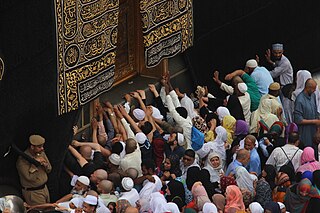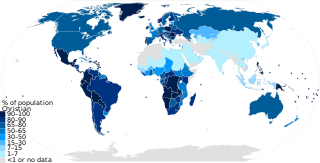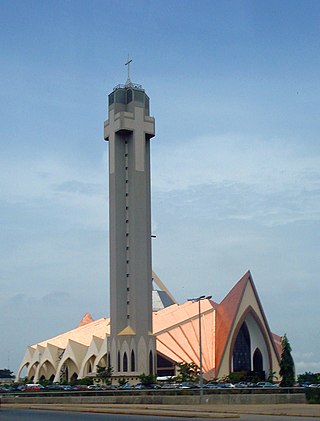
Muslims are people who adhere to Islam, a monotheistic religion belonging to the Abrahamic tradition. They consider the Quran, the foundational religious text of Islam, to be the verbatim word of the God of Abraham as it was revealed to Muhammad, the main Islamic prophet. Alongside the Quran, Muslims also believe in previous revelations, such as the Tawrat (Torah), the Zabur (Psalms), and the Injeel (Gospel). These earlier revelations are associated with Judaism and Christianity, which are regarded by Muslims as earlier versions of Islam. The majority of Muslims also follow the teachings and practices attributed to Muhammad (sunnah) as recorded in traditional accounts (hadith).

The demographics of Sudan include the Sudanese people and their characteristics, Sudan, including population density, ethnicity, education level, health, economic status, religious affiliations, and other aspects of the population.

The terms Muslim world and Islamic world commonly refer to the Islamic community, which is also known as the Ummah. This consists of all those who adhere to the religious beliefs, politics, and laws of Islam or to societies in which Islam is practiced. In a modern geopolitical sense, these terms refer to countries in which Islam is widespread, although there are no agreed criteria for inclusion. The term Muslim-majority countries is an alternative often used for the latter sense.

Islam is the most common religion in Sudan and Muslims have dominated national government institutions since independence in 1956. According to UNDP Sudan, the Muslim population is 97%, including numerous Arab and non-Arab groups. The remaining 3% ascribe to either Christianity or traditional animist religions. Muslims predominate in all but Nuba Mountains region. The vast majority of Muslims in Sudan adhere to Sunni Islam of Maliki school of jurisprudence, deeply influenced with Sufism. There are also some Shia communities in Khartoum, the capital. The most significant divisions occur along the lines of the Sufi brotherhoods. Two popular brotherhoods, the Ansar and the Khatmia, are associated with the opposition Umma and Democratic Unionist Parties respectively. Only the Darfur region is traditionally lacking the presence of Sufi brotherhoods found in the rest of the country.

The dominant religion in Sudan is Islam practiced by around 90.7% of the nation's population. Christianity is the largest minority faith in country accounting for around 5.4% of the population. A substantial population of the adherents of traditional faiths is also present.
Conversion to Islam is accepting Islam as a religion or faith and rejecting any other religion or irreligion.

Religion in Egypt controls many aspects of social life and is endorsed by law. The state religion of Egypt is Islam, although estimates vary greatly in the absence of official statistics. Since the 2006 census religion has been excluded, and thus available statistics are estimates made by religious and non-governmental agencies. The country is majority Sunni Muslim, with the next largest religious group being Coptic Orthodox Christians. The exact numbers are subject to controversy, with Christians alleging that they have been systemically under-counted in existing censuses.

As of the year 2023, Christianity had approximately 2.4 billion adherents and is the largest religion by population. According to a PEW estimation in 2020, Christians made up to 2.38 billion of the worldwide population of about 8 billion people. It represents nearly one-third of the world's population and is the largest religion in the world, with the three largest groups of Christians being the Catholic Church, Protestantism, and the Eastern Orthodox Church. The largest Christian denomination is the Catholic Church, with 1.3 billion baptized members. The second largest Christian branch is either Protestantism, or the Eastern Orthodox Church.

Islam is the second-largest religion in Europe after Christianity. Although the majority of Muslim communities in Western Europe formed recently, there are centuries-old Muslim communities in the Balkans, Caucasus, Crimea, and Volga region. The term "Muslim Europe" is used to refer to the Muslim-majority countries in the Balkans and the Caucasus and parts of countries in Eastern Europe with sizable Muslim minorities that constitute large populations of indigenous European Muslims, although the majority are secular.

Religion has been a major influence on the societies, cultures, traditions, philosophies, artistic expressions and laws within present-day Europe. The largest religion in Europe is Christianity. However, irreligion and practical secularisation are also prominent in some countries. In Southeastern Europe, three countries have Muslim majorities, with Christianity being the second-largest religion in those countries. Ancient European religions included veneration for deities such as Zeus. Modern revival movements of these religions include Heathenism, Rodnovery, Romuva, Druidry, Wicca, and others. Smaller religions include Indian religions, Judaism, and some East Asian religions, which are found in their largest groups in Britain, France, and Kalmykia.

Religion in Nigeria is diverse. The country is home to some of the world's largest Christian and Muslim populations, simultaneously. Reliable recent statistics do not exist; however, Nigeria is divided roughly in half between Muslims, who live mostly in the northern region, and Christians, who live mostly in the southern region of the country. Indigenous religions, such as those native to the Igbo and Yoruba ethnicities, have been declining for decades and been replaced by Christianity or Islam. The Christian share of Nigeria's population is also now on the decline, due to a lower fertility rate relative to the Muslim population in the country.

Between 2015 and 2060, Muslim population is projected to increase by 70%. This compares with the 32% growth of world population during the same period.

Islam in Africa is the continent's second most widely professed faith behind Christianity. Africa was the first continent into which Islam spread from Southwest Asia, during the early 7th century CE. Almost one-third of the world's Muslim population resides in Africa. Muslims crossed current Djibouti and Somalia to seek refuge in present-day Eritrea and Ethiopia during the Hijrah ("Migration") to the Christian Kingdom of Aksum. Like the vast majority (90%) of Muslims in the world, most Muslims in Africa are also Sunni Muslims; the complexity of Islam in Africa is revealed in the various schools of thought, traditions, and voices in many African countries. Many African ethnicities, mostly in North, West and East Africa consider Islam their Traditional religion. The practice of Islam on the continent is not static and is constantly being reshaped by prevalent social, economic, and political conditions. Generally Islam in Africa often adapted to African cultural contexts and belief systems forming Africa's own orthodoxies.
Asia is the largest and most populous continent and the birthplace of many religions including Buddhism, Christianity, Confucianism, Hinduism, Islam, Jainism, Judaism, Shinto, Sikhism, Taoism, and Zoroastrianism. All major religious traditions are practiced in the region and new forms are constantly emerging. Asia is noted for its diversity of culture. Islam and Hinduisms are the largest religion in Asia with approximately 1.2-1.3 billion adherents each.

Christianity in Africa arrived in Africa in the 1st century AD and in the 21st century, the majority of Africans are Christians. Several African Christians influenced the early development of Christianity and shaped its doctrines, including Tertullian, Perpetua, Felicity, Clement of Alexandria, Origen of Alexandria, Cyprian, Athanasius and Augustine of Hippo. In the 4th century, the Aksumite empire in modern-day Ethiopia and Eritrea became one of the first regions in the world to adopt Christianity as its official religion, followed by the Nubian kingdoms of Nobatia, Makuria and Alodia and several Christian Berber kingdoms.

Christianity has a long history in the region that is now Sudan. Ancient Nubia was reached by Coptic Christianity by the 1st century.
Growth of religion involves the spread of individual religions and the increase in the numbers of religious adherents around the world. In sociology, desecularization is the proliferation or growth of religion, most commonly after a period of previous secularization. Statistics commonly measure the absolute number of adherents, the percentage of the absolute growth per-year, and the growth of converts in the world.

The Organisation of Islamic Cooperation founded in 1969 has 57 members, 56 of which are also member states of the United Nations, with 48 countries being Muslim majority countries. Some member countries, especially in West Africa and South America, are – though with large Muslim populations – not necessarily Muslim majority countries. A few countries with significant Muslim populations, such as Russia and Thailand, sit as Observer States.

Christianity is the most widely professed religion in South Sudan, with significant minorities of the adherents of traditional faiths and Islam.

Adherents of Islam constitute the world's second largest religious group. A projection by the PEW suggests that Muslims numbered approximately 1.9 billion followers in 2020. Studies in the 21st century suggest that, in terms of percentage and worldwide spread, Islam is the fastest-growing major religion in the world, mostly because Muslims have more children than other major religious groups. Most Muslims are either of two denominations: Sunni or Shia. Islam is the majority religion in several subregions: Central Asia, Western Asia, North Africa, West Africa, the Sahel, and the Middle East. The diverse Asia-Pacific region contains the highest number of Muslims in the world, surpassing the combined Middle East and North Africa.













